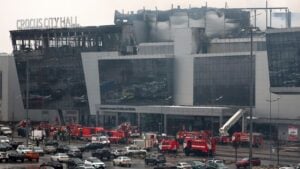Moscow Terror Attack Highlights Need for Russian-Ukrainian Peace

In recent weeks, after ISIS claimed responsibility for the Crocus City Hall Concert Attack, which killed 145 and injured hundreds more, Moscow has been doing everything in its power to find a way to blame Ukraine for the terror unleashed, rather than address the fact that the murderous terror organization known as ISIS decided to go after the Putin regime. In recent days, Russia’s top law enforcement agency the Investigative Committee alleged that they found photos on the suspects phones depicting “people in camouflage uniforms with the Ukrainian flag against the background of destroyed houses.”
To date, the Russians have not released their alleged evidence and it so far has not been independently verified, which should be a red flag to everyone regarding the accuracy of their claims. The fact that Russia is blaming Ukraine for the recent terror attack rather than understanding that they need to do more to address the ISIS threat within their country is another indignation for how badly the Russian people need to make peace with the Ukraine.
All of the hatred against Ukraine that has come out in this war has blinded the Russian leadership to the fact that there are other threats that they also need to address, such as the threat of radical Islam, and therefore, in light of these threats, it would behoove them to try and solve the Ukraine conflict so that they can better address these threats, instead of trying to falsify a Ukraine connection when there is plausibly none.
Recently, the Greek Parliament hosted a conference on ways to achieve peace in Ukraine titled “Ukraine: the search for a peaceful resolution of the military conflict.” This conference was in line with the Secretary General’s call for peace, as he noted, “Beyond condemnations, we the United Nations must actively work toward a comprehensive, just and sustainable peace in line with the charter of this organization.” It would behoove the Russian leadership to accept the olive branch that was handed out in this conference.
Greek MP Athanasios Papathanassis proclaimed at this event that “Ukraine has been the bridge between Europe and Russia, and the desire for its control and influence has led to geopolitical confrontations with a global impact. I have always supported a diplomatic solution, a diplomatic solution is based on the liberal and Western way of thinking, which goes against the authoritarian. In this disastrous context, collective effort and diplomatic flexibility are necessary for promoting and establishing peace. The global community has to unite so that pressure can be applied to all parties involved to peacefully solve all differences and to respect sovereignty and territorial integrity. The end of hostilities will contribute to the achievement of economic stability on a global scale.”
Athens’ deputy mayor Elli Papageli added: “Peace is something that happens through dialogue and diplomacy, not military conflict. The consequences of the war are huge.” She expressed fear of a nuclear war and spoke of its disastrous economic consequences for Europe.
Renowned political scientist Professor Frederic Encel expressed skepticism about the UN coming up with a solution and suggested instead that both sides of the conflict come together to reach a solution. Former CIA analyst and State Department Counter Terror expert Larry Johnson spoke out against NATO for arming Ukraine and called on the West “not to pour petrol on the fire,” stressing the need to have a peaceful dialogue with Russia.
Women’s rights activist and the president of the European Association for the Defense of Minorities highlighted « The UN secretary general called for peace in Ukraine because there is a big concern regarding children’s mental health and school dropping .Children have stopped attending school since 2 years which has a huge impact on their education and their future »
In light of this conference and in the wake of the horrific terror attack in Russia, Moscow now needs to reassess its priorities. It should not continue the war against the Ukraine at all costs and should it try to negotiate a peaceful solution to the Ukraine conflict, which will enable it to better focus on the ISIS threat, which is a graver threat to the Russian people right now than whether or not Ukraine will become a member of NATO. By Russia being so focused on the Ukraine, the Russians failed to thwart a major terror attack and many innocent people lost their lives as a result.
—
By Rachel Avraham
